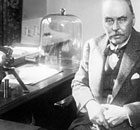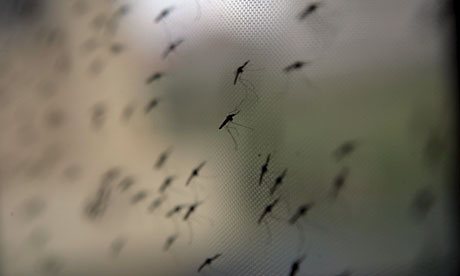World Mosquito Day – 114 years and counting in the battle against malaria
Malaria
claims 781,000 lives annually, but significant progress is being made
in the effort to deal more effectively with the disease
Mosquitos cling to a net at the
International Centre for Insect Physiology and Ecology in Nairobi.
Malaria claims 781,000 lives annually. Photograph: Stephen
Morrison/EPA
The statistics are stark: malaria claims 781,000 lives every year, with over 90% of all deaths in Africa. Those most vulnerable to malaria are children under five and pregnant women; a child dies from malaria every 45 seconds. I have just returned from Ghana, where malaria kills more children than any other disease and 100% of the population is at risk of infection.
The malady is preventable and treatable, however. There was a 20% decline in malaria-related deaths between 2000 and 2009, while 11 African countries experienced a drop of at least 50% in malaria burden over the same time period. In 2010, the lives of over 485 children were saved every day thanks to malaria prevention tools such as nets and sprays.
 Sir Ronald Ross earned the Nobel prize for medicine for his work on malaria transmission. Photograph: Getty Images
Earlier this summer, the Roll Back Malaria (RBM) partnership launched a report on funding
for malaria research and development. The report outlined the
significant progress made in recent years in terms of developing new
drugs, devising tests to diagnose the disease, and promoting the use of
nets. It also discussed the prospect of the first vaccine against
malaria, which is currently in third-stage trials in Africa.
Sir Ronald Ross earned the Nobel prize for medicine for his work on malaria transmission. Photograph: Getty Images
Earlier this summer, the Roll Back Malaria (RBM) partnership launched a report on funding
for malaria research and development. The report outlined the
significant progress made in recent years in terms of developing new
drugs, devising tests to diagnose the disease, and promoting the use of
nets. It also discussed the prospect of the first vaccine against
malaria, which is currently in third-stage trials in Africa.The report stressed the importance of continued research and development funding if we are to sustain and accelerate progress in the fight against malaria. Of particular concern is the current underfunding for diagnostic tools and vector control, a measure aimed at avoiding transmission of the disease in the first place. These areas need to be addressed to ensure not only that cases of malaria are correctly diagnosed and treated but also that the insecticides used really do prevent the spread of malaria. RBM estimates that a further three million African children can be saved by 2015 through universal coverage of prevention tools such as nets and sprays.
On 12 September, Roll Back Malaria will publish a new report, to be launched by the UN secretary general, setting out the latest gains in the fight against malaria.
In Ghana, the government is aiming to provide nets for everyone by the end of 2012. We met our Ghanaian colleagues last week to discussthe projects we are supporting alongside the British, American and Ghanaian governments. Partners in Ghana have just completed the third regional distribution of nets. We heard about the difference these nets are making for some of the poorest people in the country by offering them protection for the first time. The Ghana partnership has already distributed over 2.5m nets to help protect over five million people from malaria since May 2010.

No comments:
Post a Comment